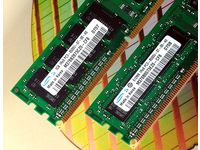Samsung makes industries smallest DDR chips
Anyone for 16GB DDR3 modules? Samsung has developed what it claims to be the industries smallest 2GB (256MB) DDR memory chips utilizing a 50nm process technology. These new chips support speeds of up to 1333MHz at 1.35 to 1.5 volts.
Samsung claims these new chips allow for up to 40 percent power savings compared to their 1GB counter-parts. We assume that this comparison refers to DDR3 modules of the same density, since you need fewer 2GB chips than 1GB ones to reach 4GB.
When the new chips hit mass production toward the end of this year you can expect to find them in 8GB desktop and server DIMMs, 4GB SO-DIMMs for notebooks and small form factor PCs, and quite possibly 16GB registered DIMMs. The latter option will require dual-die packages so it will likely cost you your left leg. The 16GB Dual-Die packages will more than likely show up in large server applications rather than desktop applications since that is currently an absurd amount of memory.
Going forward, Samsung expects that it will rely primarily on its 50nm process to make DRAM chips next year. According to numbers from IDC, the Korean firm may have to wait a couple of years for 50nm 2GB modules to go main-steam. Currently 2GB modules represent a small portion of the market with 1GB modules being the most popular.
Get Tom's Hardware's best news and in-depth reviews, straight to your inbox.
-
hannibal And now we only need to get rid of all those zillions 32 os:ses that are still in the market so that there will be support for that extra memory...Reply
Well, these will not be mainstream until the next os after windows 7 comes out. Anyone out there knows when? 2012-13?? If the windows 7 lives 3 years. *sigh*
Well all those 64 photoshop users will be happy :-)
-
16GB is NOT an absurd amount of memory.Reply
I have 8GB in my Vista Ultimate 64Bit Q6600 PC, when using Videostudio to create a AVCHD file, memory use goes from 2GB to 7.9GB. I wish that this PC was using a P45 chipset instead of X38 so I could add more RAM!. -
The summary is incorrect. It states the chips are "2GB (256MB)", which are not the same thing. 2GB is 2 gigabytes, and 256MB is 256 megabytes. What they mean is that the chips are 2 gigabits (not gigabytes), but they're using the same abbreviation, B, to mean bytes in one, and bits in the other, which is inconsistent.Reply
